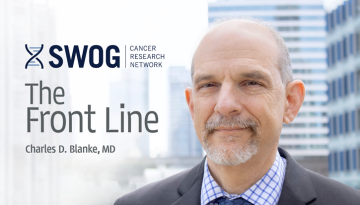Palliative Care: Fatigue, Survival, & More
Important work from our Palliative and End of Life Care (PEOLC) Committee was just published in the journal JCO Oncology Practice, and reporting on it gives me a chance to update the group on the progress of one of SWOG’s youngest research committees.
The JCO OP paper reports results of a secondary analysis of data that was led by Julia Mo, now a medical student at the University of Rochester, working with PEOLC Committee co-chair Dr. Robert Krouse and a team of SWOG statisticians and other investigators.
After analyzing data from four SWOG treatment trials – two in lung cancer and two in prostate – Mo’s team found that patients who had reported clinically significant fatigue at the start of treatment tended to have shorter overall survival times and experienced more adverse events than those without fatigue.
Fatigue is one of the symptoms our patients with cancer report most often, and the findings suggest that significant baseline fatigue may have prognostic value and that these patients should perhaps be counseled about the possibility of poorer outcomes. You can read more about the study here.
PEOLC Committee co-chair Dr. Marie Bakitas says of the work, “I think one thing to reflect on about this project is the depth and person-centered focus that our committee brings to SWOG. Also how this project continues to dispel the myth that palliative care is only about end of life.”
We can also reflect on the project as one more piece of evidence that the committee is thriving. Here are a few other convincing exhibits:
- Committee members gave two presentations at last fall’s ASCO Quality Care Symposium (one of which featured the work just published in JCO OP).
- The committee has completed S1316, which compared surgery to medical management for malignant bowel obstruction. Although it opened before the PEOLC Committee was formally inaugurated, this study was very much a product of long-standing interest in palliative care research within SWOG, the same interest that drove the committee’s formation in 2018. Dr. Krouse led S1316 and merits an award for dogged perseverance in championing it into being and eventual completion (Dr. Krouse gave a moving narrative of S1316’s multidecade saga at the spring group meeting).
- The committee is conducting S1820, a randomized trial comparing two interventions for bowel dysfunction in patients who have had rectal cancer. Accrual to this trial has just passed the halfway mark and is going great guns, due in no small part to the tireless work of study chair Dr. Virginia Sun.
- Two PEOLC protocols are in development: a randomized phase III trial of a palliative care intervention to improve the quality of life in patients with metastatic pancreatic cancer and a phase II study to estimate the prevalence of depression in participants making their first oral request for medical aid in dying.
- Other PEOLC research underway includes fascinating work on the relationship of hope (the emotion, not the foundation) and hopefulness to patient survival outcomes and to healthcare provider burnout (some of you were surveyed a while back for an earlier stage of this work).
Noting that SWOG is the only cooperative group with a palliative care committee, Dr. Bakitas says the work, “shows how our perspective can add a quality of life dimension to the cure mission of cancer research.”
Quality of life, in fact, is central to most of the committee’s work, as it is to the work of a number of other SWOG committees. The contributions of these SWOG committees to patient life quality are harder to measure than our contributions to quantity – 3+ million years of added life – but they are no less vital. According to this and other metrics, the PEOLC Committee is succeeding eminently in meeting SWOG’s mission: to significantly improve lives.
Other Recent Stories



